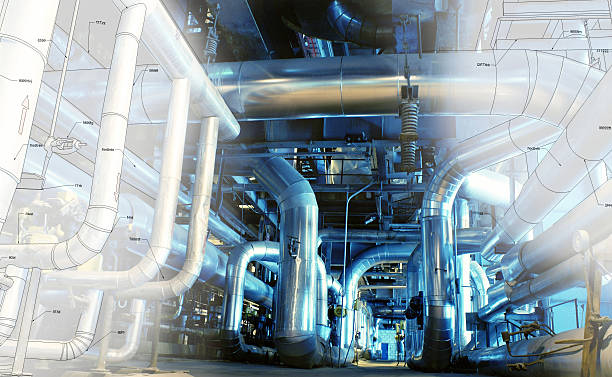Table of Contents
This article explores the innovative changes in the industrial landscape due to the rapid evolution of technology, focusing on state-of-the-art machinery.
The Advent of Advanced Manufacturing Techniques
Advanced manufacturing techniques like 3D printing, CNC machining, and robotics have significantly improved modern machinery efficiency. 3D printing converts digital models into tangible objects, while CNC machining reduces human error and increases precision. Robotics automates repetitive tasks, improving safety and productivity. These technologies have streamlined production processes, reduced waste, and provided personalized products, enhancing overall efficiency.
Automation and its Revolutionary Impact
Automation has revolutionized industries by taking over repetitive and time-consuming tasks, thereby liberating human workers for more complex responsibilities. Automated systems include robotics, AI, and IoT devices, which work in harmony to monitor, control, and optimize production processes in real-time. Factories equipped with these systems achieve higher output rates with fewer errors and reduced downtime. Moreover, automation allows for the collection of massive amounts of data, which can be analyzed to further refine operations. This data-driven approach helps in predictive maintenance, ultimately reducing unexpected equipment failures and prolonging machinery lifespan. In essence, automation acts as the backbone of modern industrial efficiency.
Sustainability through Smart Manufacturing
Smart manufacturing employs eco-friendly practices without compromising on productivity and efficiency. This approach integrates renewable energy sources, waste management systems, and energy-efficient machinery to minimize the environmental impact. Renewables like solar and wind energy power many of today&8217;s factories, reducing reliance on fossil fuels. Energy-efficient machinery uses less power while maintaining high performance, contributing to lower operational costs and a smaller carbon footprint. Additionally, modern recycling technologies enable the re-use of materials, decreasing waste and conserving resources. By adopting smart manufacturing, industries can achieve sustainable production while meeting environmental regulations.
Enhanced Safety Measures in Modern Machinery
With the advent of Industry 4.0, safety has become a paramount focus in machinery design. Modern machines are equipped with advanced safety protocols like sensors, automated shutoffs, and real-time monitoring systems. Sensors can detect irregularities and trigger alarms or automatic shutdowns to prevent accidents. For example, pressure sensors monitor hydraulic systems to ensure they do not exceed safe limits. Real-time monitoring allows for immediate response to any hazards, further safeguarding workers. Furthermore, ergonomic designs reduce physical strain, thereby minimizing the risk of injuries. These enhanced safety measures not only protect human workers but also safeguard machinery, promoting a secure and efficient work environment.
The Role of IoT in Industrial Machinery
The Internet of Things (IoT) plays a crucial role in modernizing industrial machinery. By connecting various devices and systems through the internet, IoT enables seamless communication and coordination. Sensors embedded in machinery collect data, which is then transmitted to centralized systems for real-time analysis and decision-making. This connectivity greatly improves operational efficiency, allowing for predictive maintenance and reducing downtime. Additionally, IoT can track and manage inventory, optimize supply chains, and monitor environmental conditions within the factory. As a result, the integration of IoT enhances overall productivity while ensuring that machinery operates at optimal performance levels.
Challenges and Solutions in Adopting Modern Machinery
While modern machinery offers numerous benefits, it also presents challenges that industries must overcome. One major challenge is the high initial investment required for advanced technologies. However, long-term gains in efficiency and reduced operational costs often justify the expense. Another challenge is the need for skilled labor to operate and maintain sophisticated equipment. Companies can address this by investing in training programs and continuous education for their workforce. Additionally, cybersecurity poses a significant risk, as interconnected systems are vulnerable to attacks. Implementing robust security measures, such as encryption and access controls, helps mitigate these risks. By proactively addressing these challenges, industries can seamlessly transition into the modern era.
The Future of Industrial Machinery
The future of industrial machinery is poised to be even more dynamic and transformative. Advancements in artificial intelligence and machine learning will enable machines to make more informed decisions autonomously. These technologies will further refine production processes, increase precision, and reduce waste. Human-machine collaboration will become more seamless with the development of advanced human-machine interfaces (HMIs) and augmented reality (AR). Such innovations will make it easier for workers to interact with complex machinery. Furthermore, the ongoing push for sustainability will lead to the creation of even more energy-efficient and eco-friendly machines. As technology continues to evolve, the possibilities for industrial machinery are nearly limitless, promising an exciting and revolutionary future for industries worldwide.
In conclusion, the industrial metamorphosis driven by modern machinery is profoundly reshaping production processes, making them more efficient, safe, and sustainable. As industries continue to embrace these advancements, they pave the way for a future of unparalleled growth and innovation.


